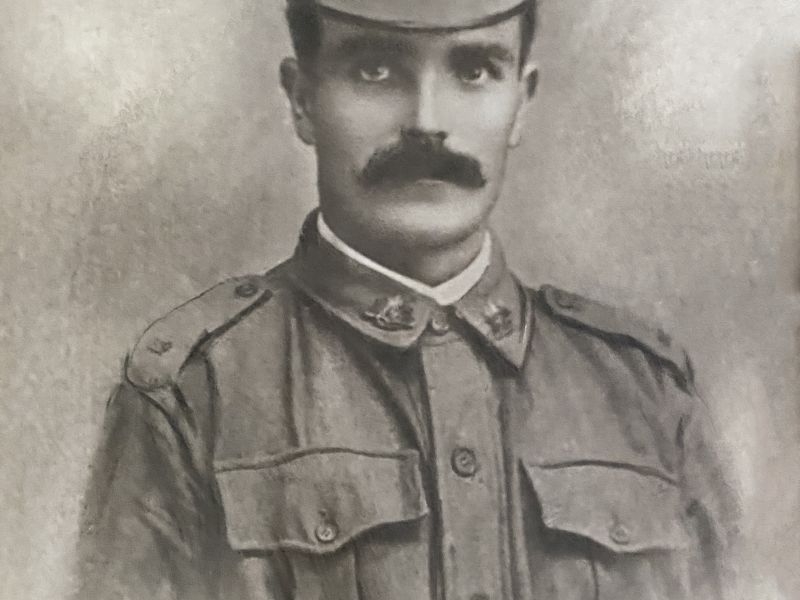George Nugent
George Nugent was born in 1888 to James and Sophie Nugent of Berrigama, Victoria. He was one of five sons of James and Sophie who would join the AIF and serve overseas.
George enlisted at Liverpool NSW on the 1 April 1915 being posted to D Company of the 20th Battalion, 5th Brigade, and the 2nd Division of the 1st AIF. He was allocated the service number 1283. He was 26 at the time of enlistment and gave his occupation as a grazier. His medical examination certificate gives his height as 5 feet 71/2 inches and describes him as having a dark complexion, brown eyes, and black hair. The 20th, like every NSW battalion, would complete their basic training at Randwick near Sydney.
On 25 June George and his battalion embarked on HMAT A35 Berrima at Sydney, arriving one month later in Alexandria, Egypt. The 20th Battalion diary of July states “Proceeded by 3 troop trains to Palai-de-Kritha near Zeitoun and marched to Aerodrome Camp, Heliopolis. This period was occupied in training the unit in Musketry, Protection, Entrenching, and Attack.”
The 20th Battalion would remain at Heliopolis for a period of approximately three weeks before embarking on the HMAT Saturnia along with the 19th Battalion and one company of the 18th on 16 August, arriving at Lemnos after an “uneventful'' voyage. George and his battalion would remain on the troopship in Lemnos harbour before arriving at Anzac on 22 August.
During his time at Anzac George and his unit would find themselves at Bauchop Hill, Russell’s Top, and Fatigue Gully. On 30 November, while at Fatigue Gully George received a bullet wound to his right knee. He was admitted to the 5th Field Ambulance, stationed at the head of Rest Gully, before being transferred to the Hospital Ship Dongola the next day.
After a sea journey of four days, George was admitted to the 1st Australian General Hospital at Heliopolis, Egypt. He remained there until March 22 when he was transferred to No. 1 Auxiliary General Hospital. After a four-day stay, he was admitted to the 3rd Australian General Hospital at Abbassia. Here his condition deteriorated and he was reported as being “dangerously ill”.
Transferred to HT Kanowna on the 10 May 1916 he returned to Australia. His medical records indicate that he was suffering from a chronic suppuration (a discharge of pus) of the right thigh as a result of his wounds. Back in Australia he was admitted to the No. 4 Australian General Hospital at Randwick near Sydney. George’s condition deteriorated until 22 July 1916 he died due to cardiac failure and septic leg. He was buried in Sydney (Waverly) General Cemetery.
George is remembered at the Australian War Memorial Roll of Honour, the Wabba and Berringama Districts Pictorial Honour Roll, the Corryong War Memorial and the New South Wales Garden of Remembrance in Rockford, NSW. For his service during the First World War, George was awarded the 1914-1915 Star, the British War Medal and the Victory Medal.

 Stephen Learmonth
Stephen Learmonth